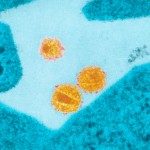Link to Pubmed [PMID] – 22292304
Bull. Acad. Natl. Med. 2011 Mar;195(3):545-57; discussion 557-9
More than 30 million people are infected by HIV worldwide. The rate of progression to AIDS is variable. A newly identified category of patients, so-called HIV controllers, spontaneously control HIV replication for long periods. HIV controllers are defined as infected patients whose viral load remains below 400 RNA copies/ml of blood, without treatment, for at least five years. We have studied the immune system of these patients, and particularly their CD4 lymphocytes, that participate in the induction, intensity, quality and duration of immune responses. CD4 lymphocytes in patients who progress to AIDS are directly targeted by the virus and participate in the activation that leads to immune deficiency. Central memory CD4 cells exhibit unusual properties in HIV controllers. Apart from the fact that they persist in large numbers and secrete large amounts of interleukin-2, which serves as an autocrine factor for their own growth, central memory CD4 cells overexpress the CCR7 homing molecule that allows them to leave capillaries and rapidly enter lymph nodes, the site of effective immune responses. These CD4 lymphocytes also men multiply rapidly, and some of them express receptors with very high antigen avidity. The presence of these central memory CD4 cells and their characteristic properties may explain the remarkable stability observed in HIV controllers. We suspect that these lymphocytes react very rapidly and efficiently to any breakthrough in viral replication. The putative relationship between HIV controllers and patients who remain asymptomatic and uninfected despite repeated exposure to the virus is discussed. Our new findings should help to guide antiretroviral therapy and vaccination strategies.

